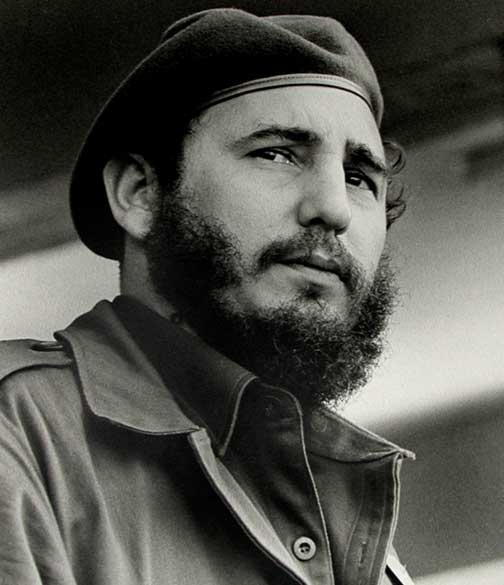Was The Legendary Fidel Castro A Hero Or Tyrant?
Fidel Castro is viewed wildly differently depending on who and where you ask.
Fidel Castro, whose death was announced Friday night on Cuban television by his brother, President Raul Castro, ruled over the island nation for half a century. During that time he was seen as both a Hero and to some a Dictator.
He will be remembered as one of the most important political figures of the 20th century, especially in Latin America, and Castro also has the added distinction of having outlived many of the main protagonists of the Cold War, including 10 US presidents.
“He was a figure who drew an incredible amount of attention. He was a global player, which is quite amazing given the relatively small size of Cuba itself,” said Oliver Stuenkel, a political analyst.
Castro’s legacy will be the subject of much debate in the days and even years to come, especially as Cuba continues to build stronger diplomatic and economic ties with the US in the wake of the 2014 breakthrough talks with President Barack Obama after decades of estrangement.
An anti-colonial hero
Stuenkel said that that Castro’s complex legacy was already clear on social media just hours after news of his death broke.
“If you look at the comments on Twitter, you will see he is being both simultaneously praised as a revolutionary someone who had the courage to stand up to the United States – and condemned as an autocrat.”
Castro and a band of revolutionaries that included the iconic Ernesto “Che” Guevara overthrew the regime of Cuban dictator Fulgencio Batista in 1959.
Despite Washington recognizing Castro’s government in 1959, relations rapidly soured between the two countries as he declared himself a Marxist-Leninist and aligned Cuba with the Soviet Union. On April 17, 1961, US-backed Cuban exiles staged the infamous failed Bay of Pigs Invasion, which aimed to topple Castro.
View this content on France 24 site
Castro’s revolution introduced sweeping social and economic reforms, but also cracked down on any form of dissent.
“Fidel Castro adopted ideas from the British National Health Service [a universal health care system] to create Cuba’s own model,” said Dr. Stephen Wilkinson, a UK-based editor of the International Journal of Cuban Studies. “Of course people in Britain don’t know that, and in general are very ignorant about him.”
Wilkinson said that while many in Europe will likely remember Castro as “tyrannical dictator”, his legacy in the developing world is quite different. For many, Castro is more closely associated with freedom and social reform.
“He was a defender of national sovereignty. He restored the dignity of the Cuban people by creating a sovereign, independent state,” Wilkinson said.
Wilkinson emphasized that Castro came to power during an era when many countries in Africa and Asia were only just emerging from colonial rule, or were still occupied by Western powers. “He was seen as a champion of the anti-colonial and anti-imperialist movements,” the UK-based editor of the International Journal of Cuban Studies said.
“He will also be remembered as a social reformer,” Wilkinson added. “He proved that you do not need a high GDP to create a strong and efficient education and healthcare system. This remains an inspiration for many poor countries and dispossessed people.”
A shifting Latin America
In the US city of Miami, where hundreds of thousands of Cuban exiles arrived after the 1959 revolution and in the decades that followed, people will undoubtedly remember Castro as the man who forced them to leave their homeland and whose policies brought about economic ruin.
Shortly after the announcement of his death, thousands of Cuban-Americans took to the streets to celebrate. People cheered, danced, waved Cuban flags and chanted “Cuba si! Castro no!”.
Political analyst Stuenkel said that in Latin America, Castro would also leave behind a mixed legacy, spun and influenced by the region’s current ideological battles.
Castro was a role model for a generation of left-leaning leaders in Latin America, especially the late Venezuelan president Hugo Chavez.
Latin America’s left wing experienced a resurgence in the 2000s, often referred to as the ‘pink tide’, sweeping into power leaders like Luiz Inacio “Lula” da Silva in Brazil and Cristina Fernandez in Argentina.
“Despite the good run for the left in Latin America, the so-called ‘pink tide’ is now coming to an end, and this will chip away at Fidel’s image in the region,” Stuenkel explained. “Brazil’s new centre-right government doesn’t share the same admiration that Lula and his Workers’ Party had for Fidel”.
The analyst said that while Castro will continue to enjoy a cult-like following among young people and the Latin American left, more conservative governments in the region will not participate in the Castro “myth-making”.
“Only a few years ago you would have seen a regional outpouring of praise for Fidel from presidents on such a day. You won’t see that now,” Stuenkel said on Saturday, following his death.
“But even his critics will recognise that Castro has a very special place in history.”
Sources: The Cuban Herald, BBC


Was Ojukwu a hero or a tyrant…?